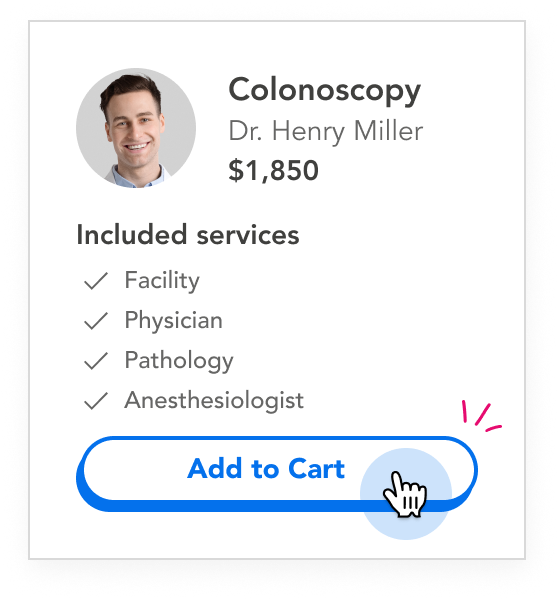Gastric Bypass Roux-En-Y in Arkansas
Save by purchasing this procedure online.
Similar Procedures: Gastric Bypass Roux-En-Y with Complications or Comorbidities, Gastric Bypass Roux-En-Y with Major Complications or Comorbidities
National Average 34,819
Regional Average17,807Save $17,012
Financing Options
Promotional financing available when you pay with CareCredit. $200 minimum purchase. What is CareCredit?
MDsave and Your Insurance
Contact your insurance company directly to see if your purchase can count towards your deductible. Details
Patton, Dr. Kristin
General and Bariatric Surgery
5.0
#5 Medical Park Drive Office Building B, Suite 102
Benton, AR 72015
Offered by

Porter, Dr. Lewis
General and Bariatric Surgery
5.0
#5 Medical Park Drive Office Building B, Suite 303
Benton, AR 72015
Offered by

Offered by

Money Back Guarantee
We will refund your payment in full if you end up not needing your purchased procedure and do not receive care. Details
Get Care In Three Easy Steps
Compare Upfront Prices

Search by procedure and location to browse local providers and compare upfront pricing.
Buy Your Procedure

Pay for your procedure online or by calling (844) 256-7696. Or buy your procedure at the facility before your appointment is scheduled.
Receive Your Care

Follow the scheduling instructions given by your provider. Bring your voucher to your appointment.
Frequently Asked Questions
View All FAQsGastric Bypass Roux-En-Y Cost in Arkansas
Save by purchasing this procedure online.
Procedure Details
Gastric Bypass: Roux-en-Y
The most common type of gastric bypass surgery, known as Roux-en-Y gastric bypass, helps patients lose weight in two ways: it reduces the size of the stomach, restricting the amount of food that can be consumed, and it also changes the way the small intestines absorb food.
The surgery has two parts. First, the top portion of the stomach is separated from the rest and formed into a small pouch that can hold about one ounce. The rest of the stomach is not removed from the body. Second, the small intestine is divided, and the lower opening is attached to the newly formed stomach pouch. This bypasses most of the stomach and the top of the small intestine, which may reduce the amount of calories and nutrients absorbed. The open end of the bypassed top portion of the small intestine is finally attached to the lower portion of intestine, so that stomach acids and digestive enzymes can come in contact with the food as it passes away from the stomach pouch.
Rerouting the flow of food away from the larger part of the stomach and top of the small intestine changes the hormones produced in the gut and can help reduce appetite and increase feelings of satiety. Gastric bypass can also reverse the condition that leads to obesity-related type 2 diabetes.1
Gastric bypass is major surgery, like all weight loss surgeries, but bypass is often considered the most technically complex. Because of this, it can have higher surgical complication rates than other procedures and typically requires a longer hospital stay for recovery. Because the body’s ability to absorb calories and nutrients is altered, gastric bypass patients may develop nutritional deficiencies (especially vitamin B12, iron, calcium, and folate) that require lifelong supplement regimens. Weight loss of 60 to 80 percent of excess weight is common, but following a nutrition and exercise plan is required to maintain weight loss.
Gastric Bypass: Biliopancreatic Diversion with Duodenal Switch
Biliopancreatic diversion with duodenal switch is a type of gastric bypass that begins with a sleeve gastrectomy - the removal of about 75 - 80 percent of the stomach, leaving behind a narrow tube, or sleeve. In this type of gastric bypass, the portion of small intestine that connects to the stomach, the duodenum, is connected to the end of the small intestine, bypassing the majority of intestine between. Like Roux-en-Y bypass, this surgery reduces the amount of food the stomach can hold and affects how calories and nutrients are absorbed.2
This type of gastric bypass is less frequently performed than either gastric sleeve or Roux-en-Y bypass because of greater risk of complications, like malnutrition and vitamin deficiency. Biliopancreatic diversion with duodenal switch is typically reserved for some patients who have a body mass index greater than 50.3
What Can You Expect During a Gastric Bypass?
Bariatric procedures are performed in the hospital, under anesthesia, in operations that can last several hours. Recovery typically takes place in the hospital or surgical center, where the hospital staff can monitor the patient for any complications.4 Since gastric bypass is a complicated procedure, recovery may take between three to five days.
After surgery, gastric bypass patients have to follow a special diet that helps the stomach acclimate to its new size. This eating plan typically starts with clear liquids, then progresses into pureed food, soft food, and eventually, solid food on a medically-monitored nutrition plan. Patients will only need to eat a small amount of food before feeling full, and the exercise and nutrition plan is designed to help patients form new, healthy habits and reinforce the need to stop eating before overeating occurs.
Are You a Good Candidate for Gastric Bypass Surgery?
Weight loss surgery like gastric bypass may be recommended for patients diagnosed with morbid obesity, meaning they have a BMI of 40 or higher. In some cases, patients with a BMI of 35 or higher may qualify if they also suffer from obesity-related health problems like diabetes, sleep apnea, joint pain, heart disease and hypertension.56 In addition, most patients must have tried and failed to lose weight through traditional diet and exercise before bariatric surgery will be considered. Check with your insurance company to see if they cover any bariatric surgery, and if so, what requirements must be met.
Before undergoing weight loss surgery, most patients will have to go through a screening process. Patients must be willing to follow a nutrition and exercise plan to both achieve and maintain a healthy weight, and commit to follow-up visits and possibly vitamin or mineral supplementation.7 A patient must also be healthy enough for surgery, both physically and mentally. A psychological evaluation is typically included in pre-operative screenings. Doctors must determine if the benefits of bariatric surgery outweigh the risks before the procedure will be performed.
What is the Difference Between Gastric Bypass and Gastric Sleeve?
The biggest difference between gastric sleeve and gastric bypass surgery is that gastric sleeve does not alter the path that food takes through the body, whereas gastric bypass reroutes food from the top of the stomach to a lower section of the small intestines, bypassing the lower stomach and upper portion of the small intestines entirely.
Gastric bypass tends to result in a greater excess weight loss and maintenance, averaging 77 percent of excess body weight versus about 50 percent in gastric sleeve. Gastric sleeve typically has a quicker in-hospital recovery time than gastric bypass, about two days as opposed to three to five. Because gastric sleeve is a less technically complicated surgery, it has a lower incidence of surgical complications. In addition, gastric bypass fundamentally alters the way the body absorbs nutrients and calories, and so bypass patients are more likely than gastric sleeve patients to develop vitamin or mineral deficiencies.
What are the Benefits and Risks of Gastric Bypass Surgery?
Gastric bypass surgery reduces the size of the stomach to about one ounce, which decreases the stomach’s capacity to hold food and encourages lower calorie intake. In addition, removing the larger part of the stomach can decrease appetite and increase feelings of satiety by decreasing ghrelin, the hormone responsible for hunger. When coupled with dedicated adherence to post-op nutrition and exercise plans, gastric bypass has the fastest results and highest success rate among weight loss surgeries, with an average 77 percent of body weight lost in the first year after surgery.89
Gastric bypass, like all bariatric procedures, may alter how the body absorbs nutrients, so patients may need to follow a supplement plan to prevent vitamin and mineral deficiencies. In extremely rare cases, excessive weight loss can occur following gastric bypass, and should be brought to a doctor’s attention as soon as possible.
Any weight loss surgery that alters the stomach, like gastric bypass or gastric sleeve, has the chance to cause a condition called dumping syndrome. In dumping syndrome, food (particularly sugars) moves from the stomach into the small intestine too quickly, where it can cause symptoms like nausea, vomiting, cramps, diarrhea, and dizziness, among others. Eating small meals and avoiding sugary foods can often help prevent dumping syndrome.
What Other Conditions Can Be Improved by Gastric Bypass Surgery?
Gastric bypass can improve quality of life for many patients struggling with obesity, including making it easier to perform everyday activities. In addition, bariatric surgery can help alleviate symptoms of other obesity-related conditions:
- Gastroesophageal reflux disease (GERD)
- Obesity-related heart disease
- High blood pressure (hypertension)
- Sleep apnea
- Type 2 diabetes
- Weight-related stroke
1 https://asmbs.org/patients/bariatric-surgery-procedures
2 https://asmbs.org/patients/bariatric-surgery-procedures
3 https://www.mayoclinic.org/about/pac-20394258
4 https://www.mayoclinic.org/about/pac-20394258
5 https://www.marinahospital.com/blog/who-is-a-good-candidate-for-gastric-sleeve-surgery
6 https://asmbs.org/patients/who-is-a-candidate-for-bariatric-surgery
7 https://www.mayoclinic.org/about/pac-20394258
8 https://bariatric.surgery.ucsf.edu/conditions--procedures/laparoscopic-gastric-bypass.aspx
9 https://asmbs.org/patients/bariatric-surgery-procedures
Procedures
© Copyright 2025 MDsave Incorporated.
All Rights Reserved.



